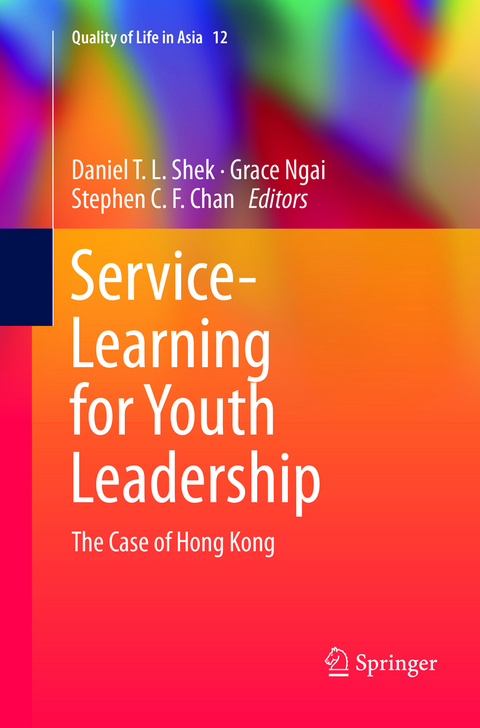
Service-Learning for Youth Leadership
Springer Verlag, Singapore
978-981-13-4418-3 (ISBN)
Daniel T.L. Shek (PhD, FHKPS, BBS, SBS, JP) is the Chair Professor of Applied Social Sciences at the Department of Applied Social Sciences and Associate Vice President (Undergraduate Programme) of Hong Kong Polytechnic University. He has taught social work students at the undergraduate and postgraduate levels for over thirty years. He was Dean of Students (1996-1998) and Dean of General Education (2006-2008) at New Asia College, the Chinese University of Hong Kong. He is Editor-in-Chief of the Journal of Youth Studies and Applied Research on Quality of Life and serves on the editorial board of many international refereed journals including Social Indicators Research and Journal of Adolescent Health. To date, he has published over 85 books, 154 book chapters and more than 500 articles in international refereed journals. Dr. Chan received his PhD from The University of Rochester, where he was a member of the Production Automation Project under Professor Herbert Voelcker. He then worked on a NURBS-based surface modeling system for industrial design for Neo-Visuals in Toronto. Subsequently he became a research officer for the National Research Council of Canada on computer-integrated manufacturing and represented Canada in the development of the international product data exchange standard, STEP. He joined the then Hong Kong Polytechnic in 1993. Dr. Chan is a firm believer of service learning. He has taken students to service projects in Hong Kong, Hubei and Gansu in mainland China, Cambodia, Myanmar and Rwanda. Together with Dr. Vincent Ng and Dr. Grace Ngai, he was given the Faculty of Engineering Award (Team) in Teaching in 2007. Together with several other colleagues, he was given the President’s Award (Team) in Services in 2008. He was appointed the founding head of the Office of Service-Learning in 2012. Dr. Ngai received her Ph.D. in Computer Science from Johns Hopkins University in 2001. Her thesis supervisor was Professor David Yarowsky. Prior to that, she studied Engineering at Brown University, where she got her Sc.B. She also got her M.S.E. (Masters of Science in Engineering) at JHU along the way to getting her Ph.D. Dr. Ngai’s main research interest is in human-centered computing, including Human-Computer Interaction (HCI) and Affective Computing. Specifically, she is interested in how humans use computers, the interplay between culture and computing, the aspect of computing that interacts back at the human, and computing that interacts with the environment. Dr Ngai’s other research interests are in computational linguistics and statistical natural language processing. She is also very interested in computing education and educational technology.
Chapter 1. The new education reform in Hong Kong: Emergence of the 4-year undergraduate program.- Chapter 2. Service-Learning as a vehicle for youth leadership: The case of The Hong Kong Polytechnic University.- Chapter 3. Case 1: Promotion of the development of migrant children in Hangzhou and Shanghai.- Chapter 4. Case 2: Promotion of the development of underprivileged children in Hong Kong.- Chapter 5. Case 3: Service Leadership through serving socially deprived students: Experience gained from corporate-community partnership (Project WeCan).- Chapter 6. Case 4: Serving clients in a drug rehabilitation agency as a vehicle to promote service leadership in university students.- Chapter 7. Case 5: Supporting STEM education through Service-Learning.- Chapter 8. Case 6: Reaching out across the digital divide: integrating engineering and non-engineering students in engineering projects to serve children in Cambodia.- Chapter 9. Case 7: Building Assistive Technology Solutions with computer knowledge (CS1).- Chapter 10. Case 8: Helping parents through modernizing ancient Chinese wisdom.- Chapter 11. Case 9: Expressive wearable art as therapy for the vulnerable groups.- Chapter 12. Case 10: Promoting quality of life through fashion for function and design.- Chapter 13. Case 11: Promotion of social development through tourism.- Chapter 14. Case 12: Nutrition and lifestyle consulting for communities in developing regions.- Chapter 15. Case 13: Designing a better environment through analyzing the built environment.- Chapter 16. Case 14: Development of a pioneer e-learning package on Service-Learning.- Chapter 17. Engaging teachers in teaching Service-Learning subjects: Strategies and challenges.- Chapter 18. Impact of Service-Learning on university students: Quantitative findings.- Chapter 19. Impact of Service-Learning on university students: Qualitative findings.- Chapter 20. The Service-Learning movement in Hong Kong: Challenges ahead.
| Erscheinungsdatum | 13.02.2019 |
|---|---|
| Reihe/Serie | Quality of Life in Asia ; 12 |
| Zusatzinfo | 23 Illustrations, color; 6 Illustrations, black and white; XIX, 365 p. 29 illus., 23 illus. in color. |
| Verlagsort | Singapore |
| Sprache | englisch |
| Maße | 155 x 235 mm |
| Themenwelt | Geisteswissenschaften ► Psychologie ► Entwicklungspsychologie |
| Studium ► Querschnittsbereiche ► Prävention / Gesundheitsförderung | |
| Sozialwissenschaften ► Soziologie ► Empirische Sozialforschung | |
| ISBN-10 | 981-13-4418-3 / 9811344183 |
| ISBN-13 | 978-981-13-4418-3 / 9789811344183 |
| Zustand | Neuware |
| Haben Sie eine Frage zum Produkt? |
aus dem Bereich


